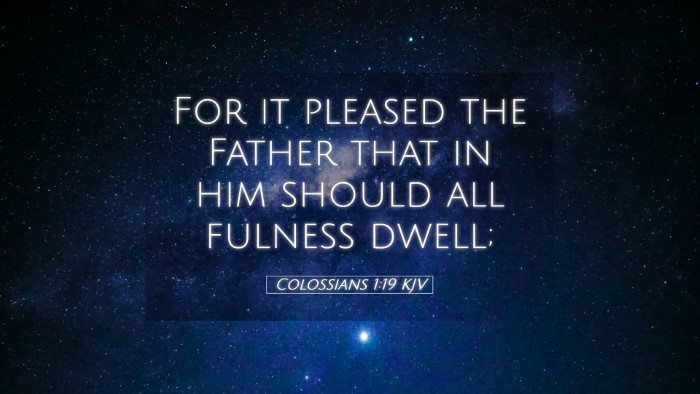Commentary on Colossians 1:19
Verse: "For it pleased the Father that in him should all fullness dwell."
Introduction
This verse encapsulates profound theological truths regarding the nature of Christ and His divine role in creation and redemption. Colossians 1:19 serves as a cornerstone for understanding the fullness of the Deity within Christ, a theme deeply explored by various public domain commentators. This commentary amalgamates insights from Matthew Henry, Albert Barnes, and Adam Clarke to provide a comprehensive theological analysis suitable for pastors, students, and scholars.
The Context of Colossians 1:19
The Epistle to the Colossians addresses issues of false teachings and the supremacy of Christ. In Chapter 1, Paul emphasizes the preeminence of Christ in creation and redemption. The apostle lays a strong foundation for understanding the fullness of God dwelling in Christ, countering heretical beliefs that undermined His divine nature.
The Fullness of God in Christ
1. The Divine Pleasure of the Father
Matthew Henry expounds on the phrase "it pleased the Father." This highlights the intimate relationship between the Father and the Son. The decision for all fullness to dwell in Christ was not arbitrary but was rooted in divine wisdom and intention. This reflects the unity and harmony within the Trinity, establishing Christ's authority and divine essence.
2. The Meaning of 'Fullness'
Albert Barnes elaborates on the term "fullness," which denotes the totality of the divine attributes and presence. This fullness includes all aspects of the Godhead—wisdom, power, omnipotence, omniscience, and love. It is not just a portion but the entirety of His divine nature, fully manifested in Christ.
3. The Implications for Believers
Adam Clarke interprets this verse to indicate that believers can find completeness in Christ. If the fullness of the Father dwells in Him, it signifies that those who are in Christ are also invited to partake in this fullness. This offers assurance to believers that their spiritual shortcomings can be fulfilled through their relationship with Christ.
Theological Reflections
1. Christ as the Mediator
The significant role of Christ as the mediator between God and humanity is underscored in this verse. His fullness represents the bridge by which humanity can access the divine. This invites reflection on how Christians are called to live in light of this truth, recognizing that all spiritual blessings flow from their connection to Christ.
2. Christ's Supremacy in Creation
The concept of fullness also extends to Christ's supremacy over creation as articulated in Colossians 1:16-17. He is not merely an extension of God's nature but the very embodiment of it. Understanding Christ as the one through whom all things were created strengthens the believer's faith in His sovereignty and control over all aspects of life.
Practical Applications for Ministry
1. Preaching on the Fullness of Christ
Pastors can draw from this text to emphasize the sufficiency of Christ in their sermons. Instruction on Christ’s divinity is crucial for establishing the foundation of faith. Encouraging congregants to delve into their relationship with Christ can lead to spiritual growth and enrich the community’s theological understanding.
2. Encouragement for Spiritual Growth
For Christians struggling with feelings of inadequacy or spiritual emptiness, this verse offers a powerful reminder of their completeness in Christ. It can be used to counsel and encourage individuals to seek more deeply the fullness of the life available to them through faith in Him.
Conclusion
Colossians 1:19 presents a monumental declaration of Christ’s divine nature and His role in salvation. The insights provided by Matthew Henry, Albert Barnes, and Adam Clarke forge a rich theological tapestry, encouraging scholars and practitioners alike to recognize and teach about the profound truth of Christ's fullness. As believers endeavor to understand this incredible mystery, they are invited to explore the depths of their faith in the One who embodies all that the Father is, residing in Him completely.


